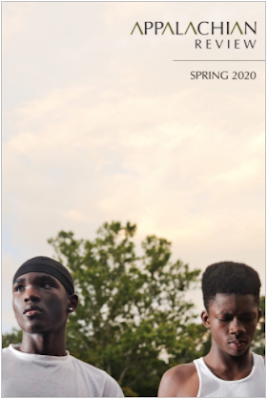Palms, Preachers, and Poems
I'm spending the winter of 2017 in the South. Deeper in the South than I've ever lived before. I'm so far south in North Carolina that I'm practically in South Carolina. In this part of the south, flowers bloom in wintertime and palm trees grow alongside the pines. In fact I'm looking at a palm tree outside my window as I write this. It's a common species, a Windmill Palm (Trachycarpus fortunei), but every time I see it I’m still astounded that it's only a few feet from my front porch.
My writing cottage—that's what I’m calling it, for now, anyway—is in an ungentrified part of Wilmington, not far from downtown. Ungentrified, as in a euphemism for black. I'm not white, but my neighbors don't know this. I mentioned it to Tracy, a neighbor who makes extra cash mowing yards on this block, but I don't think he really heard me. He must not know many writers, because he likes to joke with me about telling a friend there’s now a writer in the neighborhood, and the friend warns him to watch out, ’cause she might be like that writer in Misery. Tracy has told me this joke more than once. I don’t remind him that the woman in the movie was the one who (spoiler alert) broke the writer’s ankles and wasn’t actually the writer herself. Who was (no surprise) a man. But I get that that’s not the point. Tracy and his friends don’t know writers. Or, I’m guessing, a lot of white people. Not that I’m white, but that’s not the point either. I may as well be.
Tracy is black. My neighbor on the left, Betty, is black too. Her neighbor on the other side has a couple of backyard dogs who bark all the time, and I think Betty's happy that my Bella's not a barker. (So am I.) Directly across the street from me are a pair of small red brick homes owned by a church and run by Rev. Barbara, whom Betty calls "the lady preacher." Rev. Barbara is black as well. The two homes she runs are halfway houses, safe places where she helps struggling women get back on their feet, or perhaps on their feet for the first time. "Preaching's not in the pulpit," Rev. Barbara told me when we first met. She also told me that my house, my winter writing cottage with the palm in the front, was once a halfway house too. I didn't ask why it wasn't anymore. I'm grateful to have it. Though I'm broke and can't afford to finish furnishing it, I'm grateful it's mine. I've been writing in a way I haven't in years. I wake up most mornings and the poems come flowing out of me. Sometimes gushing, like water bursting a dam. I have to stop what I'm doing—checking email, peeling an orange, measuring coffee—and sit down and let them come.
A lot of what's coming has a religious tinge to it. Not by choice. When you’re a writer, sometimes you just open the gate and you’re as surprised as anybody at what comes sauntering through. The religiosity of the South has felt both comfortable and comforting to me since I've returned. I didn't know I was missing it, but now that I'm here, I realize I like being swaddled in it. I haven't lived in the South for 17 years. And I’ve never lived in or near the deep South, alongside black folk, since I was a child. Rev. Barbara calls me "Sister Elizabeth." She's not being ironic. When Cornel West says "Brother So-and-So" or "Sister Such-and-Such," do Yankees know that it’s not a put-on? It's the ingrained religiosity of the South, particularly of black Southern culture. It’s a religiosity that takes one look at you and takes you in, whether you want to be taken in or not. Its rhythms are musical, like a good sermon. It fearlessly abides in concepts such as righteousness. It says "brethren" without embarrassment. When it greets you for the first time it marches across the yard, with arms outstretched, and hugs you in the middle of the street.
So maybe it's not surprising that I'm finding old-timey religious language tinging my poems. Words from the Bible, like behold and firmament, serpent and sinner, resurrection and mercy and prayer. Oh, did I forget to mention I'm an atheist? An atheist drawn to the flame of religiosity, who thrills to the growl and trill of gospel music. Yes, I'm the stranger that sojourneth among the believers. I breathe their air. Their words mix with mine. In Ruth Ozeki's first novel—which is in part about a blues-obsessed Japanese woman’s encounter with the ungentrified South—a character jokes about "hybrid vigor." I know something about being hybrid myself. It's too soon to say whether these new poems are vigorous or not, but for now the gate’s staying open. Whatever comes through, I’ll embrace. Brother Line. Sister Stanza. Your heathen sibling awaits.
You can read some of these tinged-with-religion poems them here.



The information you've provided is useful because it provides a wealth of knowledge that will be highly beneficial to me. Thank you for sharing about palm plants online. Keep up the good work.
ReplyDeleteThe wagering necessities for other online on line casino bonuses are sometimes much more durable, which means most no deposit bonuses are easier to take advantage of|benefit from|reap the benefits of}. This online on line casino provides their slots gamers 메리트카지노 a variety of|quite so much of|a wide selection of} on line casino bonus codes to choose from|to select from}, together with a massive crypto deposit bonus and another with free spins. Bonus spins on chosen games only and should be used within seventy two hours.
ReplyDelete